“Lady first” is a common phrase we usually hear that shows respect towards women. However, it is a fact that in family relationships, at work or in society, women do not always get priorities. In some cases, they even are downtrodden.
How to help the women have opportunities to maximize their chance of success at work and improve their sense of self-worth and ability to influence society are the targets of gender equality programs. These programs have received active participation from a lot of enterprises and organizations, including Diageo.
Diageo has announced the “Plan W – empowering women through training” campaign, committing US$10 million to empower two million women in 17 countries in Asia Pacific in 2013-2017. The campaign will take a tailored approach for each country in order to address the specific needs of women in each market.
In Vietnam in particular, Diageo will pour US$756,000 (VND16 billion) to carry out the campaign through cooperation with the Centre for Social Initiatives Promotion (CSIP) which plays a leading role in supporting the emerging social entrepreneurship sector in Vietnam and enables the economic empowerment of women through social enterprises.
Stephane Gripon, Diageo Vietnam’s general manager, said that in Vietnam, Plan W will focus on three main pillars – developing the company’s employees; the hospitality industry; and community development – within five years. Then, Diageo will track and monitor progress against targets over the next years.
To develop Diageo’s employees, the company will support female employees by enhancing their skills with soft skills training on work-life balance; self-defense and personal care. This will help increase the number of female managers, contributing to the new global target of 30% of women in leadership roles by 2014.
Meanwhile, regarding the hospitality industry pillar, the company will offer skills training to women in the hospitality industry to improve their knowledge and job prospects.
Diageo piloted a bartender skills program in partnership with three hospitality vocational schools – Nguyen Truong To, Khoi Viet and Saigontourist for the benefit of 1,000 bartenders, contributing to the regional target of training 20,000 bartenders across Asia.
Concerning the last pillar, Diageo partners with local non-governmental and non-profit organizations like CSIP to deliver skills-based training and seek funding to marginalized women to start their own businesses.
From a business viewpoint, Gripon hopes that Plan W will help Diageo Vietnam make a difference in offering female staff choices and opportunities to maximize their chance of success as well as promote them to positions of influence in the company.
“We are looking at a long-term method to help the industry and community, with the bartender training program and a bunch of CSR activities; and now with Plan W, we pin high hopes on creating many impactful changes to our industry in which women account for 72% of employees as well as the communities where we operate,” added Gripon.
According to Gripon, in the bigger picture, Plan W will contribute to Government efforts in the implementation of 2011–2020 National Strategy and 2011–2015 National Program on Gender Equality.
Thanks to the campaign, female employees at companies who are eager to start their own businesses will be trained and offered a loan. Besides, female employees can register to join self-defense, gender equality or gender diversity training courses in Asia Pacific.
Pham Kieu Oanh, CSIP’s director, said that empowering women is the best way to progress to a more equal society by giving women access to resources to help them achieve success for the benefit of their children, their families and society as a whole.
Accordingly, CSIP will find and work with suitable enterprises that use a lot of female employees or manufacture products for women in order to provide women there supports not only in finance but training. So far, CSIP has supported 29 social projects that have impacted the lives of more than 200,000 disadvantaged people.
About the significance of the community campaign, Stephane Gripon said that when the campaign is run well, it will create a double value that either polishes the business’s image or contributes to making the society where the business is operating become better.






















































